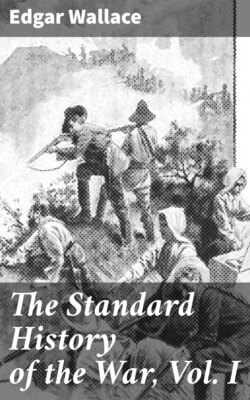Читать книгу The Standard History of the War, Vol. I - Edgar Wallace - Страница 5
На сайте Литреса книга снята с продажи.
HOW THE BRITISH FOUGHT
ОглавлениеTable of Contents
WHILST the British were thus engaged, the French on their right were being driven into French Lorraine, and the German forces left to contain the Belgian Army were carrying out their work of destruction.
On the day that Sir John French was fighting so desperately before Le Cateau-Cambrai, the Germans, on the pretext of punishing the shooting of some of their soldiers by the civilian population, had set to work to destroy Louvain, a Zeppelin had dropped bombs on Antwerp, and the great battle before Lemberg had begun in Galicia. These facts are given that the reader may assemble in their chronological order the events of that fateful week. There can be no doubt but that the position of the British Army was critical. If the arrival of the 4th Division had been delayed for two hours the Army Corps under Smith-Dorrien could hardly have extricated itself without suffering enormous losses, if indeed it could have got away at all. The fighting was of a peculiarly fierce character, but pressed as they were the British were a terribly punishing force. Their fire, well directed, was never wasted. The men nursed their ammunition and "shot for heads."* The story is told by one officer that he had all his work cut out to get one section to retire, and there can be no doubt that the losses we sustained in the shape of missing and prisoners taken by the enemy was due largely to the courage of our men, who stuck to their work of beating back the Kaiser's corps.
The German soldiers themselves directed the whole of their resources to outflanking their British opponents.
An Imperial order had gone forth to the German forces directing them
"to devote the whole of your attention to the treacherous English and to walk over General French's contemptible little army."
The task was no light one, in whatever spirit of confidence the German legions came. They sustained enormous losses in the face of the British rifle fire, which has won the admiration of the Allies.
Cool as though on parade or firing at Ash ranges, the infantry were offered excellent practice at between 500 and 600 yards. This is the range at which the British army has invariably shown its highest percentage of hits, and the German losses before Cambrai and Le Cateau must have been very heavy, for the rifle used by our men is the best weapon in the field.
Even in their success the Germans were again and again repulsed.
"They came on in solid formation," writes one officer, "shoulder to shoulder, the most confident body of men that ever marched on to a battle- field. Some of them had unsmoked cigars stuck between the buttons of their tunics ... it looked as if nothing could arrest that heavy mass, but after a sighting shot or two our men got the range and then you saw things happen. In three minutes from being a solid body it became a ragged, straggling line, then it peeled away to nothing. Behind was another double company, and the same thing happened all over again. It was extraordinary to see them skipping and jumping over the bodies of their fallen comrades only to fall themselves and become a further obstacle to the men behind."
This was the British punch, a staggering one, but numbers told in the long run. Swiftly moving columns began to work round the British left, and the order to retire came none too soon. Field-Marshal French was himself under fire most of this day.
